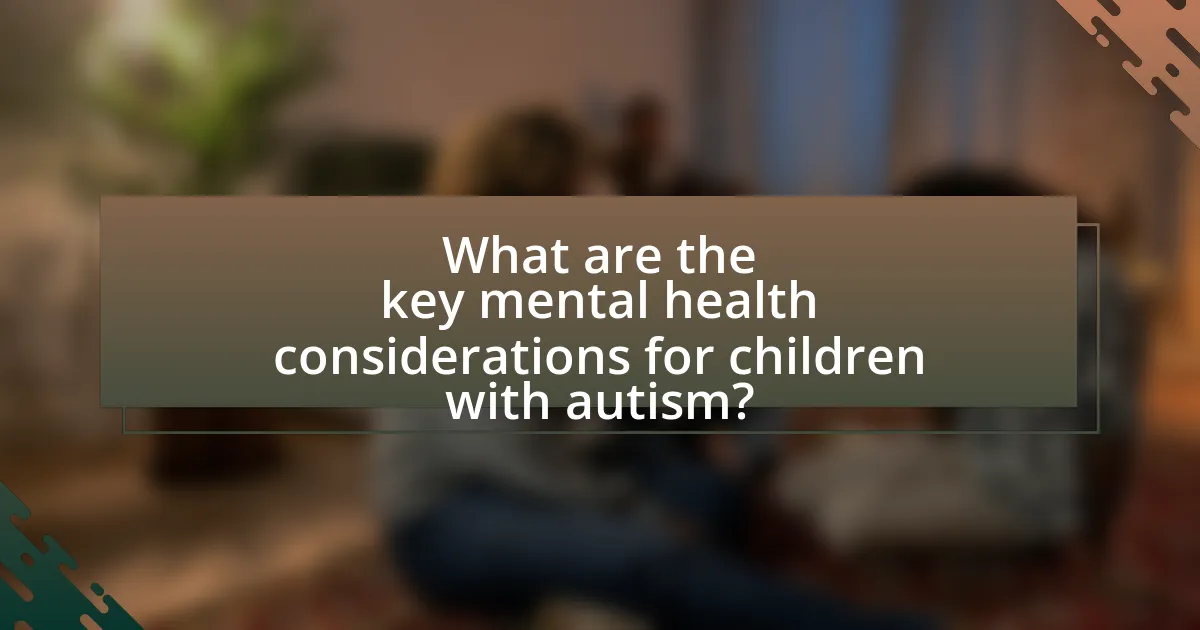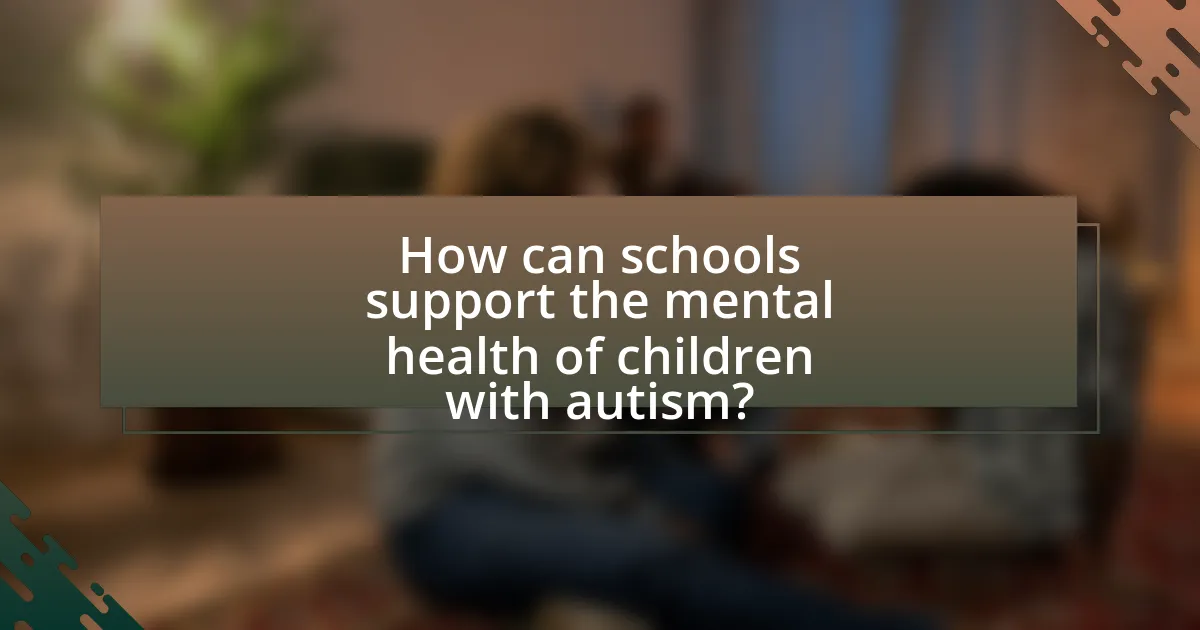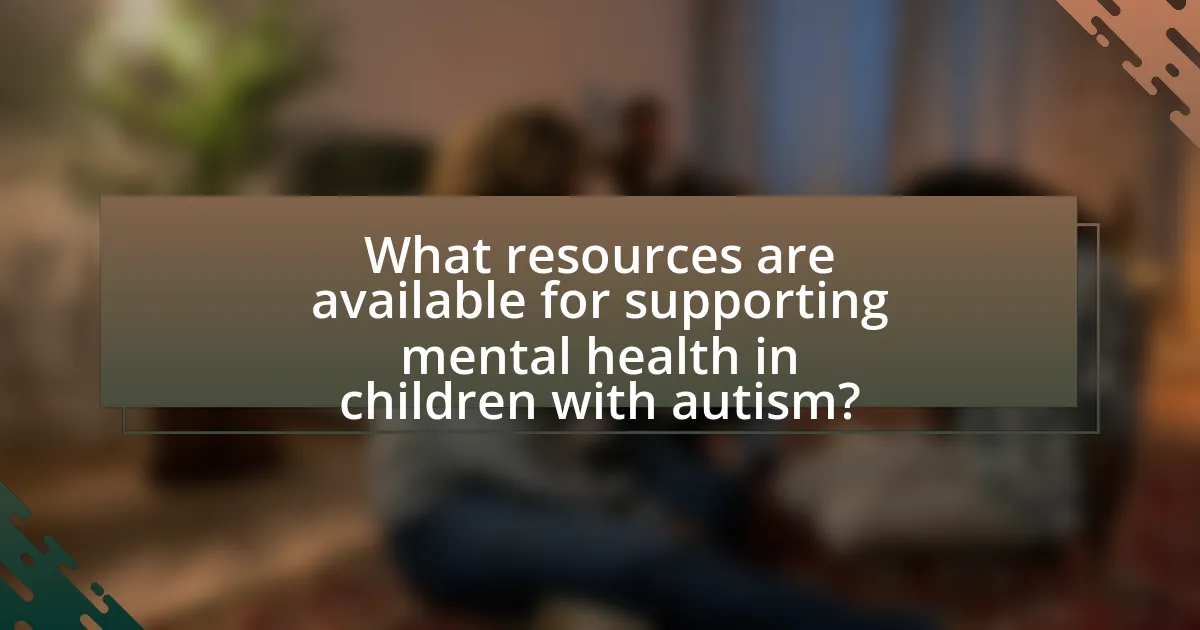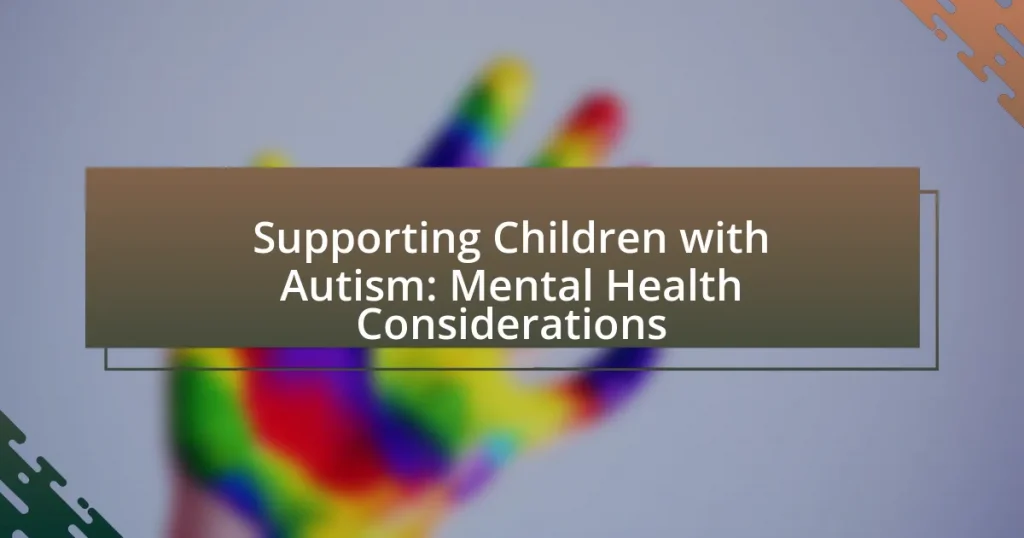The article focuses on the mental health considerations for children with autism, emphasizing the prevalence of anxiety, depression, social skills deficits, and sensory processing issues. It highlights the significant impact of autism spectrum disorder (ASD) on mental health, including the increased risk of co-occurring conditions and the specific challenges faced by these children. The importance of early intervention, tailored therapeutic approaches, and supportive environments is discussed, along with strategies for parents, educators, and communities to enhance mental well-being. Additionally, the article outlines available resources and practical tips for families to support their child’s mental health effectively.

What are the key mental health considerations for children with autism?
Key mental health considerations for children with autism include anxiety, depression, social skills deficits, and sensory processing issues. Children with autism often experience heightened anxiety levels, with studies indicating that up to 40% may also meet criteria for anxiety disorders. Additionally, they are at an increased risk for depression, particularly during adolescence, due to social isolation and challenges in communication. Social skills deficits can lead to difficulties in forming relationships, which further exacerbates mental health issues. Sensory processing issues can also contribute to anxiety and behavioral challenges, as children may struggle to cope with overwhelming sensory input. Addressing these considerations through tailored interventions and support systems is crucial for promoting mental well-being in children with autism.
How does autism spectrum disorder impact mental health?
Autism spectrum disorder (ASD) significantly impacts mental health by increasing the likelihood of co-occurring mental health conditions such as anxiety, depression, and attention-deficit/hyperactivity disorder (ADHD). Research indicates that individuals with ASD are at a higher risk for these conditions due to challenges in social communication, sensory sensitivities, and difficulties in coping with change. For instance, a study published in the Journal of Autism and Developmental Disorders found that approximately 40% of children with ASD also experience anxiety disorders, highlighting the strong correlation between ASD and mental health issues.
What specific mental health challenges do children with autism face?
Children with autism face specific mental health challenges, including anxiety, depression, and social difficulties. Research indicates that approximately 40% of children with autism experience anxiety disorders, which can manifest as excessive worry, fear, or avoidance behaviors. Additionally, studies show that children with autism are at a higher risk for depression, with prevalence rates ranging from 10% to 30%. Social difficulties, such as trouble forming friendships and understanding social cues, further exacerbate these mental health issues, leading to feelings of isolation and low self-esteem. These challenges highlight the need for targeted mental health support for children with autism.
How do sensory sensitivities relate to mental health in autistic children?
Sensory sensitivities significantly impact the mental health of autistic children by contributing to heightened anxiety, stress, and behavioral challenges. Autistic children often experience sensory overload, which can lead to meltdowns or shutdowns, exacerbating feelings of frustration and isolation. Research indicates that sensory processing issues are linked to increased levels of anxiety and depression in this population, as noted in a study published in the Journal of Autism and Developmental Disorders, which found that 70% of autistic children reported sensory sensitivities that correlated with mental health difficulties. Addressing these sensitivities through tailored interventions can improve emotional regulation and overall well-being in autistic children.
Why is early intervention important for mental health in children with autism?
Early intervention is crucial for mental health in children with autism because it significantly enhances developmental outcomes and reduces the severity of symptoms. Research indicates that early therapeutic support can lead to improved social skills, communication abilities, and emotional regulation. For instance, a study published in the journal “Pediatrics” found that children who received early intervention services showed greater improvements in cognitive and adaptive functioning compared to those who did not receive such support. This early assistance helps mitigate the risk of co-occurring mental health issues, such as anxiety and depression, which are prevalent in children with autism. Therefore, timely intervention not only fosters better mental health but also promotes overall well-being and quality of life for these children.
What role does early diagnosis play in supporting mental health?
Early diagnosis plays a crucial role in supporting mental health by enabling timely interventions that can significantly improve outcomes for individuals, particularly children with autism. Research indicates that early identification of autism spectrum disorder (ASD) allows for the implementation of tailored therapeutic strategies, which can enhance social skills, communication, and emotional regulation. For instance, a study published in the journal “Pediatrics” found that children who received early intervention services showed greater improvements in cognitive and adaptive functioning compared to those who did not receive such support. This underscores the importance of early diagnosis in facilitating access to necessary resources and support systems, ultimately fostering better mental health and developmental trajectories for children with autism.
How can early interventions improve outcomes for autistic children?
Early interventions can significantly improve outcomes for autistic children by enhancing their communication skills, social interactions, and adaptive behaviors. Research indicates that children who receive early intervention services, such as Applied Behavior Analysis (ABA) or speech therapy, show greater improvements in cognitive and language development compared to those who do not receive such support. For instance, a study published in the journal “Pediatrics” found that children who began intensive behavioral intervention before the age of 4 had better outcomes in IQ and adaptive functioning than those who started later. This evidence underscores the critical role of timely and targeted interventions in fostering developmental progress in autistic children.
What strategies can be employed to support mental health in children with autism?
To support mental health in children with autism, strategies such as individualized therapy, social skills training, and family support programs can be employed. Individualized therapy, including cognitive-behavioral therapy (CBT), has been shown to effectively address anxiety and depression in autistic children, enhancing their coping mechanisms. Social skills training helps children develop essential interpersonal skills, which can reduce feelings of isolation and improve their ability to interact with peers. Family support programs provide education and resources to families, fostering a supportive environment that is crucial for the child’s mental well-being. Research indicates that these strategies collectively contribute to improved mental health outcomes for children with autism, as evidenced by studies highlighting the positive impact of tailored interventions on emotional regulation and social integration.
How can parents and caregivers create a supportive environment?
Parents and caregivers can create a supportive environment by fostering open communication, establishing routines, and promoting inclusivity. Open communication allows children to express their feelings and needs, which is crucial for emotional well-being. Establishing consistent routines provides a sense of security and predictability, helping children with autism navigate their daily lives more effectively. Promoting inclusivity involves engaging children in social activities and encouraging interactions with peers, which can enhance social skills and reduce feelings of isolation. Research indicates that supportive environments significantly improve the mental health outcomes for children with autism, as they feel more understood and accepted.
What therapeutic approaches are effective for mental health support?
Cognitive Behavioral Therapy (CBT) and Applied Behavior Analysis (ABA) are effective therapeutic approaches for mental health support, particularly for children with autism. CBT helps individuals identify and change negative thought patterns and behaviors, which can improve emotional regulation and coping strategies. Research indicates that CBT can significantly reduce anxiety and depression symptoms in children with autism (Reaven et al., 2012, Journal of Autism and Developmental Disorders). ABA focuses on reinforcing positive behaviors and reducing maladaptive ones, leading to improved social skills and communication. Studies show that ABA can enhance adaptive functioning and decrease problem behaviors in children with autism (Lovaas, 1987, Journal of Consulting and Clinical Psychology).

How can schools support the mental health of children with autism?
Schools can support the mental health of children with autism by implementing individualized education plans (IEPs) that address specific emotional and social needs. These plans can include tailored interventions such as social skills training, access to mental health professionals, and sensory-friendly environments. Research indicates that structured support within educational settings significantly improves the mental well-being of autistic children, as evidenced by a study published in the Journal of Autism and Developmental Disorders, which found that targeted interventions led to reduced anxiety and improved social interactions among students with autism.
What role do educators play in supporting mental health?
Educators play a crucial role in supporting mental health by creating a safe and inclusive environment that fosters emotional well-being. They implement strategies such as social-emotional learning, which has been shown to improve students’ mental health outcomes. Research indicates that schools with strong mental health programs can reduce anxiety and depression rates among students, particularly those with autism, by providing tailored support and interventions. Additionally, educators can identify early signs of mental health issues and facilitate access to resources, ensuring that students receive the necessary help.
How can teachers identify mental health issues in autistic students?
Teachers can identify mental health issues in autistic students by observing changes in behavior, communication, and social interactions. For instance, a noticeable increase in anxiety, withdrawal from social activities, or changes in academic performance may indicate underlying mental health concerns. Research indicates that autistic individuals are at a higher risk for conditions such as anxiety and depression, with studies showing that up to 70% of autistic students experience mental health issues at some point. Teachers should also utilize standardized assessment tools and collaborate with mental health professionals to gain a comprehensive understanding of the student’s needs.
What training do educators need to effectively support these children?
Educators need specialized training in autism spectrum disorder (ASD) to effectively support children with autism. This training should include understanding the characteristics of ASD, strategies for communication and social skills development, and techniques for managing challenging behaviors. Research indicates that educators who receive targeted professional development in these areas are better equipped to create inclusive classrooms and foster positive learning environments for children with autism. For instance, a study published in the Journal of Autism and Developmental Disorders found that teachers who participated in autism-specific training reported increased confidence and competence in supporting their students.
What accommodations can be made in the classroom?
Accommodations that can be made in the classroom for children with autism include individualized instruction, sensory-friendly environments, and the use of visual supports. Individualized instruction allows teachers to tailor lessons to meet the unique learning needs of each student, which is crucial as research indicates that personalized approaches can significantly enhance learning outcomes for children with autism. Sensory-friendly environments, such as quiet spaces or reduced lighting, help minimize sensory overload, which is often a challenge for these students. Additionally, visual supports, like schedules and charts, aid in communication and understanding, as studies show that visual aids can improve comprehension and reduce anxiety in autistic learners.
How can individualized education plans (IEPs) address mental health needs?
Individualized education plans (IEPs) can address mental health needs by incorporating specific goals and accommodations tailored to the emotional and psychological well-being of students. These plans can include strategies such as regular access to counseling services, social skills training, and behavioral interventions that are designed to support mental health. Research indicates that students with autism often experience higher rates of anxiety and depression, making it essential for IEPs to include mental health assessments and interventions to promote emotional resilience and coping strategies. By integrating mental health support into the educational framework, IEPs can facilitate a more holistic approach to the development of children with autism, ensuring that their mental health needs are met alongside their academic goals.
What strategies can be implemented to reduce anxiety in the classroom?
Implementing structured routines and providing a supportive environment are effective strategies to reduce anxiety in the classroom. Structured routines help children with autism understand what to expect, thereby minimizing uncertainty and stress. Research indicates that predictable schedules can significantly lower anxiety levels in students with autism, as they thrive in environments where they know what comes next. Additionally, creating a supportive environment that includes sensory breaks, calming spaces, and positive reinforcement can further alleviate anxiety. A study published in the Journal of Autism and Developmental Disorders found that sensory-friendly classrooms lead to improved emotional regulation and reduced anxiety in children with autism.
How can peer relationships impact the mental health of children with autism?
Peer relationships significantly impact the mental health of children with autism by influencing their social skills, self-esteem, and emotional well-being. Positive interactions with peers can enhance social competence and reduce feelings of isolation, which are common among children with autism. Research indicates that children with autism who have supportive friendships experience lower levels of anxiety and depression. For instance, a study published in the Journal of Autism and Developmental Disorders found that peer acceptance is linked to improved mental health outcomes in children with autism, highlighting the importance of social connections in fostering resilience and emotional stability.
What programs can promote social skills and peer interactions?
Programs that can promote social skills and peer interactions include Social Skills Training (SST), Peer-Mediated Interventions, and Social Stories. SST focuses on teaching children specific social skills through role-playing and modeling, which has been shown to improve social competence in children with autism. Peer-Mediated Interventions involve typically developing peers in structured activities to facilitate social interactions, leading to increased engagement and communication among children with autism. Social Stories, developed by Carol Gray, provide narratives that help children understand social situations and appropriate responses, enhancing their ability to navigate social contexts effectively. These programs are supported by research indicating their effectiveness in improving social skills and peer relationships among children with autism.
How can bullying be addressed to protect mental health?
Bullying can be addressed to protect mental health by implementing comprehensive anti-bullying programs in schools and communities. These programs should include education on empathy, conflict resolution, and the impact of bullying on mental health, which can lead to a reduction in incidents. Research indicates that schools with effective anti-bullying policies see a 20-30% decrease in bullying behaviors, as reported by the National Center for Educational Statistics. Additionally, providing support systems such as counseling and peer support groups can help victims of bullying cope with the psychological effects, thereby promoting better mental health outcomes.

What resources are available for supporting mental health in children with autism?
Resources available for supporting mental health in children with autism include specialized therapy programs, educational resources, and community support services. Evidence-based therapies such as Applied Behavior Analysis (ABA) and Cognitive Behavioral Therapy (CBT) have been shown to improve mental health outcomes for children with autism. Additionally, organizations like the Autism Society and the National Autism Center provide valuable information and resources for families, including guides on mental health interventions and local support groups. Research indicates that early intervention and tailored support can significantly enhance the emotional well-being of children with autism, making these resources crucial for effective mental health support.
What types of professional support can families access?
Families can access various types of professional support, including behavioral therapy, speech therapy, occupational therapy, and mental health counseling. Behavioral therapy, such as Applied Behavior Analysis (ABA), is widely recognized for its effectiveness in improving social skills and reducing challenging behaviors in children with autism. Speech therapy focuses on enhancing communication skills, while occupational therapy helps children develop daily living skills and sensory integration. Mental health counseling provides emotional support and coping strategies for both children and their families, addressing the psychological aspects of autism. These services are often provided by licensed professionals, including psychologists, speech-language pathologists, and occupational therapists, ensuring that families receive expert guidance tailored to their specific needs.
How can therapists and counselors assist in mental health support?
Therapists and counselors assist in mental health support by providing tailored interventions that address the unique needs of individuals, particularly children with autism. They utilize evidence-based therapeutic techniques, such as cognitive-behavioral therapy (CBT) and play therapy, to help children develop coping strategies, improve social skills, and manage anxiety. Research indicates that early intervention through therapy can significantly enhance emotional regulation and behavioral outcomes in children with autism, leading to improved overall mental health. For instance, a study published in the Journal of Autism and Developmental Disorders found that children who received targeted therapy showed greater improvements in social functioning compared to those who did not receive such support.
What role do support groups play for families of autistic children?
Support groups play a crucial role for families of autistic children by providing emotional support, practical advice, and a sense of community. These groups facilitate connections among parents and caregivers, allowing them to share experiences and coping strategies, which can reduce feelings of isolation and stress. Research indicates that participation in support groups can lead to improved mental health outcomes for caregivers, as they gain access to resources and information that empower them to better advocate for their children. For instance, a study published in the Journal of Autism and Developmental Disorders found that parents who engaged in support groups reported lower levels of anxiety and depression compared to those who did not participate.
What community resources are beneficial for mental health support?
Community resources beneficial for mental health support include local mental health clinics, support groups, and educational programs tailored for families of children with autism. These resources provide access to professional counseling, peer support, and information on coping strategies. For instance, the National Alliance on Mental Illness (NAMI) offers community-based programs that connect families with mental health professionals and support networks, which can significantly improve mental health outcomes for children with autism. Additionally, many communities have organizations that provide workshops and training for parents, enhancing their ability to support their children’s mental health effectively.
How can local organizations provide assistance and resources?
Local organizations can provide assistance and resources by offering specialized programs, support groups, and educational workshops tailored for children with autism and their families. These organizations often collaborate with mental health professionals to deliver evidence-based interventions, such as social skills training and behavioral therapy, which are crucial for the development of children with autism. For instance, the Autism Society reports that community-based programs can significantly improve social interactions and emotional well-being in children with autism, demonstrating the effectiveness of localized support systems. Additionally, local organizations may provide access to resources like informational materials, referral services, and financial assistance for therapy, which are essential for families navigating the complexities of autism care.
What online resources are available for families seeking support?
Online resources available for families seeking support include websites such as Autism Speaks, which offers toolkits and community resources, and the National Autism Association, providing safety information and family support. Additionally, the CDC’s Autism Spectrum Disorder page offers educational materials and links to local services. These resources are validated by their extensive outreach and the comprehensive information they provide to families navigating autism-related challenges.
What practical tips can help families support their child’s mental health?
Families can support their child’s mental health by establishing a consistent routine, fostering open communication, and promoting social interactions. A structured daily schedule helps children with autism feel secure and understand expectations, which can reduce anxiety. Open communication encourages children to express their feelings and concerns, enhancing emotional understanding and support. Additionally, facilitating social interactions with peers can improve social skills and reduce feelings of isolation, which are common in children with autism. Research indicates that these strategies can significantly enhance emotional well-being and resilience in children with autism, leading to better mental health outcomes.
How can families create a daily routine that supports mental well-being?
Families can create a daily routine that supports mental well-being by incorporating structured activities, consistent schedules, and opportunities for relaxation. Establishing a predictable routine helps children with autism feel secure, as it reduces anxiety associated with uncertainty. Research indicates that children with autism benefit from routines that include time for physical activity, social interaction, and quiet time, which collectively enhance emotional regulation and reduce stress. For instance, a study published in the Journal of Autism and Developmental Disorders found that structured daily routines significantly improve behavioral outcomes in children with autism. By integrating these elements into their daily lives, families can foster an environment that promotes mental well-being.
What self-care strategies can parents implement to support their child’s mental health?
Parents can implement self-care strategies such as establishing a consistent routine, practicing mindfulness, and engaging in regular physical activity to support their child’s mental health. Establishing a consistent routine provides children with a sense of security and predictability, which is crucial for those with autism, as it can reduce anxiety and improve overall well-being. Mindfulness practices, such as deep breathing exercises or meditation, can help both parents and children manage stress and enhance emotional regulation. Engaging in regular physical activity, such as family walks or sports, not only promotes physical health but also releases endorphins, which can improve mood and reduce feelings of anxiety. Research indicates that structured routines and physical activity positively impact mental health outcomes in children with autism, reinforcing the effectiveness of these self-care strategies.
